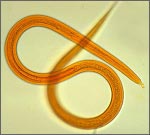 |
|||||||||||||||||||
|
|

We are the proud winners of the 2006 - 2009 winner of the Muse Medallion for Online Magazine by The Cat Writers? Association in their annual Communications Contest! (Photo courtesy of Weems Hutto).
On November 17, 2007 Felinexpress.com was honored to receive The President's Award by the Cat Writers' Association. We are very proud to have earned this distinction and will continue to provide quality information for all cat lovers.
Felinexpress.com Home > Cat Health > You Cat and Worms |
Your Cat and Worms
“My kitten has worms!” I hear this all the time in emails when concerned kitten owners reaching one of my websites after they decide that I can cure their kitten of the parasites invading their system.
The truth is both cats and kittens get worms at one time or another in their lifetime. Not all kittens are born with worms (like it is popularly believed).
Worming medicine should only be prescribed by your vet. Not by some helpful person in a forum who mentions an over-the-counter wormer that will “cure” the problem.
Over-the-counter wormers can be dangerous to the health of your cat. They are sometimes not as potent as what your vet would give to you, and sadly, some people do not follow the instructions on over-the –counter wormer. For this reason their cat might suffer for their owner's carelessness.
If you suspect your cat has worms, a vet needs to see your cat/kitten. The vet will determine the health of the animal, and also weigh the cat. There are other factors to consider, the age of the cat/kitten, is the cat pregnant?
If you suspect your cat has worms, make a vet appointment and let the vet run a fecal and bloodwork in order to identify which parasite has taken up housekeeping in your cat.
Worm Identification
The common worms found in cats are tapeworms and roundworms are common in kittens.
 Tapeworms are visible to the naked eye, once the host worm (that is inside the cat) starts shedding segments of itself. These segments are called proglottids, a fancy name for smaller worm segments that look like grains of rice. Once outside the cat, the tapeworms can be seen crawling around the litter pan, clinging to the cat’s tail, or if the cat has been sitting on your lap, the tapeworm might be on your leg.
Tapeworms are visible to the naked eye, once the host worm (that is inside the cat) starts shedding segments of itself. These segments are called proglottids, a fancy name for smaller worm segments that look like grains of rice. Once outside the cat, the tapeworms can be seen crawling around the litter pan, clinging to the cat’s tail, or if the cat has been sitting on your lap, the tapeworm might be on your leg.
Your cat may start scooting her rear on the carpet when she has tapeworms. She will also have fleas, because that is where tapeworms come from (generally). If she is on a raw meat diet, or you gave her raw meat as a treat, she can contract tapeworms from the raw meat. If you let her outside to hunt mice and small rodents, she can get tapeworms that way. Humans can get tapeworms from their cat, this is especially true for small children so proper hygiene should be used at all times after petting the cat, or cleaning the litter pans.
 Roundworms- Roundworms are harder on the cat’s system than tapeworms. Roundworms look like cooked spaghetti noodles, and the kitten will pass them either through the feces, or she will vomit them up. Kittens can get roundworms in utero from the mother cat and also through nursing. Kittens with roundworms show rotund tummies and ravenous appetites. The kitten will have diarrhea vomiting and worse case scenario, the roundworms can cause obstructions and health issues. The worms free float in the system, instead of being attached to an intestinal wall. If roundworms are not treated in kittens, the kittens can die. The kitten will begin to be lethargic, vomit up mostly foam and have strings or diarrhea showing in the litterpan.
Roundworms- Roundworms are harder on the cat’s system than tapeworms. Roundworms look like cooked spaghetti noodles, and the kitten will pass them either through the feces, or she will vomit them up. Kittens can get roundworms in utero from the mother cat and also through nursing. Kittens with roundworms show rotund tummies and ravenous appetites. The kitten will have diarrhea vomiting and worse case scenario, the roundworms can cause obstructions and health issues. The worms free float in the system, instead of being attached to an intestinal wall. If roundworms are not treated in kittens, the kittens can die. The kitten will begin to be lethargic, vomit up mostly foam and have strings or diarrhea showing in the litterpan.
Cats can contract roundworms by eating affected rodents or ingesting eggs. Since roundworms lay thousands of eggs, immediate disinfecting of litter pans and bedding is required. Humans can also get roundworms, so always maintain proper hygiene when cleaning litter pans.
Your cat or kitten will require several treatments to rid roundworms from their system. Keep on schedule with the treatment, even if you think the cat is doing better.
Hookworms- Hookworms are blood-sucking parasites and can quickly cause anemia in your cat. Hookworms are about ½” long, and when your cat is affected, you will see darkened stool or blood in the stool. Your cat will be lethargic with runny stool and gradually grow weaker. They can be seen in a fecal exam. Heavy infestations of Hookworms can cause your cat to vomit up these brown colored worms along with streaks of blood. Proper hygiene habits should be practiced when cleaning the litter pans as hookworms can penetrate the skin of humans. The cat comes in contact with hookworms by eating small rodents or ingesting eggs.
Whipworms-whipworms take up residence in the intestine sucking blood through the lining of the stomach to stay alive. Found more often in dogs, they are one worm that can live outside the host body for a long period of time. If your cat has long bouts of diarrhea, is losing weight and is anemic, ask your vet to test her for whipworms.
Stomach Worms resemble roundworms but they are smaller. If the cat is an inside/outside cat and loves to hunt, being infected by this worm is a real possibility. Eating bugs, small rodents, or coming in contact with other cat’s emesis can result in a stomach worm invasion.
Symptoms are: loss of appetite, lethargy, vomiting, diarrhea, weight loss and low-grade fever. Sometimes these parasites are overlooked and the cat is diagnosed with another disease but never gets better. In some cats, they never exhibit any symptoms but are still infected. These worms quickly rob the cat of necessary nutrients and should be dealt with quickly. Your vet would need to perform a fecal exam.
Eyeworms - Eyeworms are not common, but they do happen. Carried by flies, the worms lay in the underlining of the eye. Eyeworms get into the tear ducts and cause excessive tearing, conjunctivitis and the eye can become swollen, red and irritated. Your vet needs to treat these eyeworms with topical ointments and numbing drops.
Heartworms - the new worm on the block, heartworm is caused by the bite of the mosquito. Cats that live in hotter climates, or near stagnant water sources are most at risk. The worms that enter the cat’s system after the bite, produce offspring mictofilaries. These offspring enter the bloodstream, eventually reaching the heart where they take up residence in the heart and pulmonary vessels. They mature there. Your cat’s symptoms would be coughing, respiratory problems, seizure and death. There is currently no known cure for heartworm. There is however a preventative, it is called Heartguard. Talk to your vet about this new pill.
Mary Anne Miller is a freelance writer, website content provider and member of The Cat Writers’ Association. Her expertise lies in feral cat socialization, bottle babies and animal abuse issues.
More cat breeds |
|
? Copyright 2006-2010 Felinexpress.com, All Rights Reserved
Privacy Statement - Disclaimer - About Me


